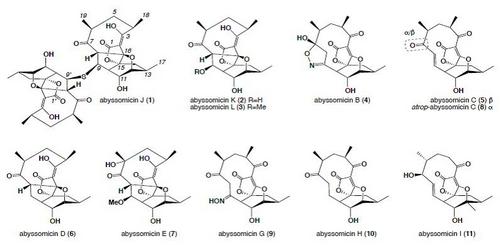Tuberculosis (TB), known as the “white plague”, is a chronic infectious disease which spreads through the respiratory tract and occurs mainly in the lungs. It is second only to HIV/AIDS as a leading cause of death from infectious diseases. Future projections are even more alarming, due to the catastrophic synergy with HIV, the global movement of people, inadequate public health programs, drug resistance, and the persistent nature of infection.
Prof. ZHANG Lixin and his colleagues at the Institute of Microbiology, Chinese Academy of Sciences (IMCAS) have developed a high quality natural product library (NPL) and high throughput screening (HTS) assay on Bacille Calmette–Guérin (BCG). It was performed with a strain of Mycobacterium bovis (BCG Pasteur 1173P2) containing a constitutive Green Fluorescent Protein (GFP) expression vector (pUV3583c-GFP) using direct readout of fluorescence as a measure of bacterial growth. Based on the NPL and HTS method, a series of extracts with anti-BCG activity were detected and bioassay guided fractionation of large-scale fermentation metabolites were proceeded.
Collaboration with Prof. Robert Capon’s group at the University of Queensland, Australia led to a series of novel abyssomicins discoveries from the Verrucosispora strain, including three novel compounds abyssomicins J, K, and L and four known abyssomicins B, C, D, and H.
As a first in class abyssomicin homodimer with a single sulfur atom bridge, abyssomicin J showed anti-BCG activity with MIC values of 3.125 μg/mL. Among the known abyssomicins, only abyssomicin C and atrop-abyssomicin C with the Michael acceptor enone moiety have been attributed anti-TB properties. The chemical semi-synthesis revealed the transformation from abyssomicin C into Michael adducts abyssomicins J, K, and L. They also discovered that 1 transformed into atrop-abyssomicin C rapidly in BCG cells then killed the cells.
These studies make a contribution beyond the specifics of the abyssomicin pharmacophore by drawing attention to the possible utility of thioether Michael addition adducts as a means to stabilize highly reactive Michael acceptors, thereby enhancing bioavailability and improving therapeutic potential. The thioether Michael adduct prodrug concept offers a promising new approach to “chemically package” bioactive Michael acceptors, improving their chances of being developed into clinically useful drugs.
This work has been patented and published in Angewandte Chemie International Edition.
The project is supported by the Gates Foundation - the Global Alliance for TB Drug Development, Genzyme Pharmaceuticals, Inc., and the Knowledge Innovation Project of the Chinese Academy of Sciences.

Abyssomicins from marine-derived Verrucosispora sp. MS100128 (Image by Prof. Zhang's Lab)